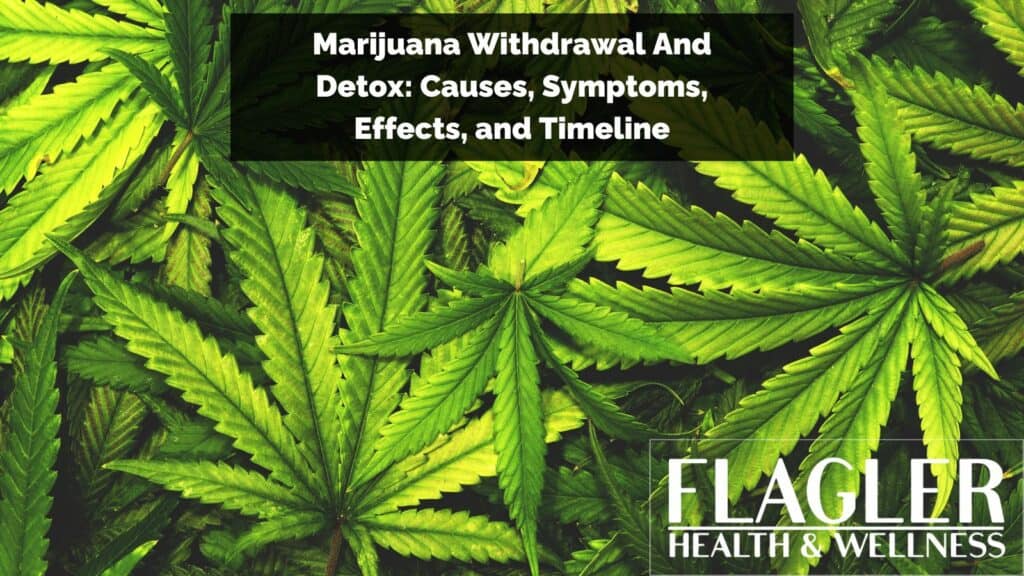Marijuana withdrawal is a natural response that occurs when an individual stops using marijuana regularly. Withdrawal marks the beginning of physical and psychological symptoms, which are the body and mind’s adjustment to the absence of cannabinoids.
Marijuana withdrawal symptoms can vary widely but often include irritability, insomnia, and changes in appetite. Users may also experience mood swings and heightened anxiety during this period.
The causes of marijuana withdrawal are rooted in the body’s adaptation to regular exposure to cannabinoids, such as THC. When cannabis use is suddenly halted, the mind and body have to adjust to their absence.
Marijuana withdrawal has physical and psychological effects that vary from person to person. You may notice changes in your mood, appetite, sleep patterns, and overall well being.
Difference Between Marijuana Withdrawal And Marijuana Detox?
Marijuana withdrawal is the body’s natural response to someone stopping or significantly reducing their use of cannabis. Marijuana detox is a systematic process designed to eliminate THC and other cannabis-related substances from the body. Detoxification is a structured approach to promoting overall health and wellness in addition to removing addictive compounds from the body.
What Is The Cause Of Marijuana Withdrawal?
Marijuana withdrawal is caused by the body’s dependence on THC, which has physical and psychological effects. Once a dependency is formed, the body and brain are used to receiving regular doses of THC to feel “normal” and will respond with withdrawal symptoms without the presence of the drug.
Symptoms Of Marijuana Withdrawal During Detox
People tend to experience a range of withdrawal symptoms when they stop or reduce their use of marijuana. Some addiction professionals agree that cannabis withdrawal syndrome is present when an individual experiences three or more of these symptoms, which may include some of the following:
Physical Symptoms
- Changes in Appetite: Many individuals experience changes in their appetite, often a decrease, during marijuana withdrawal.
- Sleep Disturbances: Difficulty falling asleep, staying asleep, or changes in sleep patterns are common.
- Physical Discomfort: Some may experience headaches, nausea, or a general sense of physical distress.
Psychological Symptoms
- Changes in Mood: Anxiety or depression can occur while a person’s brain chemistry adjusts.
- Drug Cravings: A desire to use marijuana to alleviate withdrawal symptoms is common.
- Cognitive Changes: Some individuals might experience a temporary decrease in cognitive abilities, such as memory and concentration.
When Does Marijuana Withdrawal Start?
Marijuana withdrawal symptoms usually begin 1-2 days after a person’s last dose, especially if they use cannabis regularly. These withdrawal symptoms peak within 2-6 days, and tend to taper off within three weeks. It is possible for certain symptoms, such as insomnia, to continue for up to a month or more after stopping using marijuana.
What Are The Effects Of Marijuana Withdrawal (Long Term and Short Term)?
Understanding the effects of marijuana withdrawal is crucial for individuals embarking on the journey to recovery. These effects can be categorized into short-term and long-term, each impacting the individual in different ways.
Short-Term Effects of Marijuana Withdrawal
- Mood Swings: Fluctuations in mood, ranging from irritability to sadness, are common in the initial stages of withdrawal.
- Changes in Appetite: Increases or decreases in appetite, along with changes in eating patterns.
- Physical Discomfort: Some individuals may experience headaches, nausea, or a general sense of unease.
- Anxiety and Restlessness: Feelings of anxiety or restlessness can occur as the body adjusts to the absence of THC.
Long-Term Effects of Marijuana Withdrawal
- Cognitive Function Improvement: Over time, memory, concentration, and overall cognitive abilities can improve as the brain recovers from prolonged THC exposure.
- Emotional Stability: Gradual stabilization of mood and emotions, leading to fewer mood swings and a more balanced emotional state.
- Overall Well-Being: Many individuals report a sense of improved well-being, including better physical health and an enhanced sense of clarity.
- Social and Behavioral Changes: Improvements in social interactions and personal relationships, as well as increased motivation and productivity.
- Reduction in Dependency Symptoms: Diminished cravings for marijuana and a decreased likelihood of relapse into usage.
How Long Does Marijuana Withdrawal Take?
Marijuana withdrawal during detox can take up about a week, with symptoms becoming more mild as time passes. Your specific withdrawal timeline may vary depending on your history of marijuana use, the presence of co-occurring mental health issues, and or polydrug use. A person’s overall health, physical resilience, age, weight, and genetics can also play a role.
What Happens During Marijuana Withdrawal?
Marijuana withdrawal occurs when someone suddenly stops using or significantly reduces their use of marijuana. Neurotransmitter levels and receptor sensitivity recalibrate as the system adapts to the absence of cannabinoids like THC, which is the psychoactive component of marijuana. Here are some of the neurological adjustments people go through during withdrawal:
- Neurotransmitter Levels: Regular use of marijuana alters the levels of various neurotransmitters in the brain, including dopamine and serotonin. During withdrawal, these levels begin to return to their natural state.
- Receptor Sensitivity: Marijuana use affects cannabinoid receptors in the brain. Withdrawal leads to a period where these receptors must adjust to the absence of THC, affecting mood and behavior in various ways.
Factors That Affect Marijuana Withdrawal
There are a wide range of factors that will impact an individual’s experience of marijuana withdrawal.
Understanding these factors can help in preparing for and managing the withdrawal process more effectively. Here are a few to consider:
Personal History of Drug Use
- Frequency of Use: Regular, heavy use of marijuana typically results in more intense withdrawal symptoms.
- Duration of Use: Long-term marijuana users may face a more extended withdrawal period compared to those who have used the drug for a shorter time.
- Amount of Use: Higher doses of marijuana can lead to more significant withdrawal symptoms.
Mental Wellbeing
- Pre-existing Mental Health Conditions: Conditions such as anxiety, depression, or other mental health disorders can exacerbate withdrawal symptoms.
- Psychological Dependence: The level of psychological reliance on marijuana plays a crucial role in the withdrawal experience and a person’s ability to manage drug cravings.
- Stress Levels: High stress can intensify withdrawal symptoms, particularly anxiety and irritability.
Physical Health
- Overall Physical Condition: General health and wellness can affect the body’s ability to cope with the changes during withdrawal.
- Co-occurring Substance Use: The use of other substances, including alcohol or prescription medication, can influence the nature and severity of marijuana withdrawal.
How To Treat Marijuana Withdrawal
An effective treatment plan for marijuana withdrawal begins with a medically supervised detox, especially if someone is using marijuana along with other drugs. One-on-one therapy and group therapy sessions, support groups, and holistic therapies such as yoga or acupuncture can help manage specific symptoms. Tailored treatment plans ensure that you receive the individual attention and support you need to heal.
Can I Die From Marijuana Withdrawal?
Unlike other drugs, marijuana withdrawal is generally not associated with any life-threatening risks. However, individual health conditions and or the presence of other drug use should be considered. When in doubt, please consult a health professional with addiction treatment experience and always seek medical attention if you are experiencing intense symptoms.
How To Cope With Marijuana Withdrawal
It’s important to have a plan in place to cope with marijuana withdrawal. Here are a few different forms of support to explore, in addition to rehab programs that offer medically supervised detox and therapeutic support:
- Support Systems: Engaging with supportive friends, family, or support groups can be beneficial.
- Healthy Lifestyle Choices: Maintaining a balanced diet, regular exercise, and good sleep hygiene can help manage withdrawal symptoms.
- Mindfulness and Relaxation Techniques: Practices such as meditation, yoga, or deep breathing can aid in managing stress and mood swings.
- Counseling and Therapy: Professional help can be valuable, especially for those experiencing significant psychological symptoms or people with a history of trauma.
Get Help At Flagler
At Flagler, we offer a range of treatment options to assist individuals struggling with marijuana use. From the initial detox phase to ongoing therapy and support, we are committed to providing compassionate and effective care tailored to each individual’s needs.
Our treatment programs utilize a combination of modalities and support to help you recover from addiction and build a strong foundation for the life you’d like to lead. No matter where you are on your recovery journey, there is always help available. Reach out to us today for more information about how our heroin treatment programs can help you or a loved one.
Share This Post







